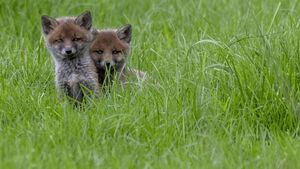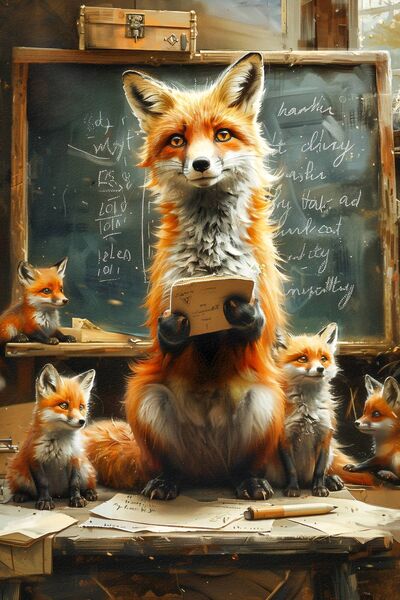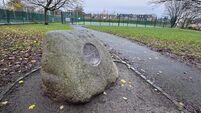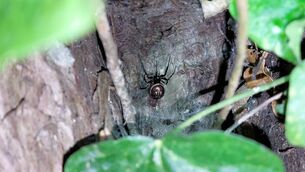Parenting lessons from the animal kingdom

Fox cub siblings gazing in puzzlement at the astonishing world they have just been born into. Picture: Donagh Cronin
In Ireland's verdant fields and misty forests, a silent symphony of parental devotion plays out daily, unnoticed by most human eyes. While we busy ourselves with the latest parenting fads and frets, our wild neighbours are quietly getting on with the business of raising their young with a primal purity that puts us to shame.
I have been contentedly observing my robin family, the hedge redolent with the hungry cries of hatchlings. Once hatched, both parents work tirelessly, making up to 400 daily feeding trips. Their devotion is astonishing, primal in instinct, but spiritually elevating to observe.
They are not alone in our native species. The fox, that russet rogue of Irish folklore, shows a tenderness that belies its reputation. Vixen mothers are fiercely protective, moving their kits between multiple dens to confound predators. Far from being an absentee father, the dog fox brings food to his mate and later teaches the kits essential hunting skills. One can't help but draw a wry comparison to certain human fathers who consider 'babysitting' their children a heroic act worthy of a medal and a pint.
Even the much-maligned badger, that striped denizen of the night, displays admirable parental qualities. Badger cubs stay with their parents for over a year, learning the intricate social rules of their clan. It's a far cry from the human tendency to ship our offspring off to playschool at the earliest opportunity, a tradition that's given us so many a maladjusted adolescent.
Contrast this with the spectacle of human parenting, which often seems more performance art than primal instinct. Take the recent trend of 'gentle parenting' where every interaction must be a teachable moment, every emotion validated, and every conflict an opportunity for growth. It's exhausting just to think about it, let alone practice. One imagines a badger mother overhearing such saccharine sentiments, snorting derisively before getting on with the practical business of teaching her cubs how to dig for worms.
Irish mythology is rife with tales of animal nurturers.
The story of Tuan Mac Cairill, who shape-shifted through various animal forms, speaks to the enduring nature of parental care across species. Tuan carefully guarded his eggs in his salmon form, a task many a human father might baulk at. The legendary Cú Chulainn was said to have been suckled by a wolf, perhaps explaining his ferocious nature and questionable table manners.
In Irish art, too, we find celebrations of animal parenthood. Take the Book of Kells, where intricate animal illustrations often depict mother and young, a testament to our ancestors' reverence for nature's familial bonds.
But what wisdom can we flighty, fickle humans glean from nature's example? How can we be more patient, protective, and nurturing to our progeny?

Patience is a virtue best learned from the animal kingdom. The Irish hare, that elusive creature of myth and moorland, spends up to 32 days nurturing its leets. There are no quick fixes or shortcuts here - just dedication and time. This is a far cry from our human penchant for parenting books promising to solve all our problems in just five easy steps.
Protection is another area where we could take a leaf from nature's book. The Irish stoat, small but fierce, will fearlessly defend its kits from predators many times its size. Compare this to the modern human parent, who is more likely to be found frantically child-proofing electrical sockets than facing down actual threats. Perhaps we've lost touch with our more primal protective instincts, trading them for a false sense of security born of bubble wrap and warning labels.
As for nurturing, we must look no further than the familiar farm animals that dot the Irish landscape. A ewe will recognise her lamb's bleat among hundreds, responding with unerring accuracy to her offspring's needs. It's a level of attunement that puts to shame our human habit of half-listening to our children while scrolling through social media.
Famous figures throughout history have often drawn inspiration from animal parenting. Charles Darwin, that keen observer of nature, marvelled at the devotion of animal parents, noting that it usually surpassed that of humans. One can't help but wonder what he'd make of our current crop of helicopter parents, hovering anxiously over their offspring like so many neurotic seagulls.
Yeats found profound meaning in the natural world. In his poem, , he observes the swans' unwearied hearts, a quality many a weary human parent might envy.
Suppose we approached parenting with the same sense of timeless continuity. We'd be less inclined to fret over every developmental milestone and more able to appreciate the fleeting beauty of childhood.
There's a primal purity to a creature caring for its young that we humans, with our complicated emotions and societal expectations, often struggle to match. A mother otter teaching her pup to swim doesn't wonder if she's doing it right or if other otters are judging her technique. She does what comes naturally, guided by instinct honed over millennia.
As we stumble through the minefield of modern parenting, it may be time we remembered our wild neighbours. Could we benefit from more vulpine cunning in protecting our young from life's dangers? Might we learn something from the robin's tireless devotion to feeding its chicks? Could we emulate the badger's patience in teaching life skills?
But we're not animals, at least in theory. Our evolved societies and complex brains bring their own challenges and rewards to the parenting process. But in our tendency to overthink every aspect of child-rearing, we may have lost touch with some fundamental and instinctive truths.
Nature doesn't have to fret about work-life balance or worry about the negative impact of screen time. It doesn't compare to other parents on Instagram or agonise over educational achievements. It instinctively gets on with the business of nurturing its offspring with a focus and dedication that's both humbling and inspiring.
So next time you find yourself stressing out over some parenting challenge, take a moment to look out the window. That blackbird patiently teaching its fledgling to forage, or that fox carefully guiding its kit through urban dangers, might remind you to live in the moment.
Ultimately, the greatest lesson we can learn from nature's parents is to love fiercely, protect bravely, nurture patiently, and trust in the ancient wisdom encoded in our buried instincts. For all our human complexities, we are still, at heart, instinctively parental - and sometimes, the most profound truths are found in listening to our gut feelings.
Our friends in the animal kingdom may not have parenting books or online forums, but they have something far more valuable: millions of years of evolutionary success. So the next time you're fretting over your nurturing skills, remember: somewhere out there, a badger raises its cubs without a moment of self-doubt or so much as a self-help book. And apparently, they are doing just fine.





